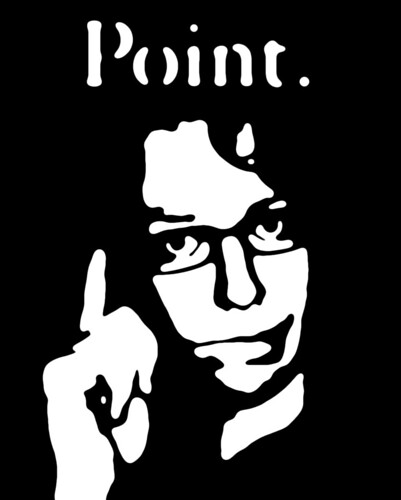 Up until now, to you blogging may have been something that your aunt did to keep the extended family in the loop or something your creative writer roommate did to put her work up online. You may not have thought about blogging in an academic context before, and the idea can take some getting used to.
Up until now, to you blogging may have been something that your aunt did to keep the extended family in the loop or something your creative writer roommate did to put her work up online. You may not have thought about blogging in an academic context before, and the idea can take some getting used to.I'm a big proponent of blogging in academic courses--I even wrote a research paper on the subject that I'm presenting at a conference in March. Blogging provides a way for you to synthesize ideas in writing and get them out there for your classmates and the world to see. However, the purpose of blogging in this course is bigger than that.
You see, part of becoming digitally literate is sharing your ideas and contributing to the online conversation. It's true that in this class, blogging will be a way for you to record your ideas, share them with your classmates, trace your learning process over time, and make progress toward your final projects. But more important than that, blogging is one of the most powerful ways for you to shape your online identity--an identity that will take on more and more importance if you wish to make an impact in our increasingly technological world.
In this post I'll outline some aspects of the blogging process in terms of Consume, Create, and Connect that will not only help you do well in the class, but will help you make your blog a vibrant learning record of lasting value to you and others and make your voice a part of the conversation.
Consume:
 Let's face it--there's a lot of material out there on the Internet. So how do you successfully navigate this massive quantity of information and sort through it to find what you need?
Let's face it--there's a lot of material out there on the Internet. So how do you successfully navigate this massive quantity of information and sort through it to find what you need?My process when I took Digital Civilization was generally to think about what I already knew and then to do a preliminary search and turn up some general resources. This year is a little different. We've assigned each person two books to read, so you can start there. This semester we would like to see more focus on clear connections between your time period and your digital culture concept, so search with those things in mind. Now, Wikipedia and Google are also a nice place to start, but they definitely should not be the end destination. Dr. Burton wrote an excellent post last year entitled "Ten Ways Out of the Google or Wikipedia Rut." Read it. It's good.
Your research does not have to be limited to Internet searches. Is there somewhere you can go to learn more about the subject? You could even go to the library (gasp!) and check out an actual book. You can see if there's an event or lecture happening soon on campus that you could attend. You could find museums and art galleries in or around Provo with exhibits from the time periods we're dealing with. Get out and take an active approach to your learning. I think one of the most important things to remember when you're doing self-directed learning in this stage is to find something about the subject that interests and you. Finding something you care about makes for better writing and more engaging posts.
Create:
This stage, for blogging, takes its main form in a blog post (duh). However, these posts should not be a same-format-every-time-report-I'm-turning-in-to-get-credit. This is not yo' mama's history report, people. Your post can take many forms: a photo essay, an analysis of a YouTube video, a list, a diagram, an animation, a whatever. The possibilities are endless. We would like to see you engaging the information in an intelligent, thoughtful manner and making clear connections between the historical periods and digital concepts. There are two aspects in particular we want to focus on this semester that make for more engaging posts: narratives and claims.
 |
| Make one in your posts. |
- Narrative: Narratives can take several forms. How did you come upon this information? What personal experiences have you had that shed light on the topic at hand? When you tie your insights to something concrete, such as a personal experience, they give your posts depth and credibility. There is power in the personal, and especially for blogging, a medium which relies heavily on personal appeal to make its impact. Dalton, from the class in Fall 2010, was an excellent example of incorporating narratives into his posts. In a post involving Keynesian economics, he relates several different personal anecdotes and based on those and the information he researched, he makes a claim (more about claims in a second). Posts like this are more likely to create conversation, and conversation is what we want!
- Claim: Rather than just regurgitating information, we would challenge you to dig deep for insights and see if you can make an intelligent, persuasive claim based on what you have learned. Basically, your main premise should be along the lines of, "Judging from what I've learned about this historical period and this digital concept, this is the claim I have to make." Why does this information matter right now? Why does this historical period matter to YOU? State your position, ask some questions, and invite people to enter into conversation with you. Hillary does a great job in her post outlining humanism, a big theme in the Renaissance, how it relates to her right now, and asking a thoughtful question at the end. Remember that kid back in high school that always asked the teacher if what you were learning would ever be of any use? Well, we're trying to teach you to answer that question for yourselves. Nothing we learn is in a vacuum, and once we learn to see the connections between concepts and people and ideas, we eliminate the realm of useless information and find that our learning takes on more significance than ever before.
So you've written your blog post, and now you have to share it. Again, we are trying to generate conversation, and one of the best ways to do this is to target your audience. Your circles on Google+ will be a critical part of the audience for your blogs, but we want you to think bigger. We challenge you to think in terms of social discovery--moving past the interface to the face: finding people, in person and online, who are talking about things you are learning. One of the first questions in your mind when you begin researching that topic should be, "Who can I talk to about this?"
Talk with your roommate who took Civ 2 last semester and see what she remembers about the Renaissance. Talk to that computer geek in your ward who runs Linux on his machine and ask him what he thinks about open source software. Post some links on Google+ and see what your classmates have to say about the sources you've found so far. Go on Twitter and search your digital concept and see what comes up. There are people out there who are interested and invested in the topics we cover in this class, and your job is to find them. Social discovery, as Dr. Burton explains in his post, is "the big game-changer." Read more about it here.
A final thought: One of the best ways to get better at blogging and to optimize its value is to stick with it and post often. Not all your posts will be brilliant, but gradually you'll create a body of information that has variety and depth. You'll be able to look back and see how far you've come and realize that you knew more than you thought you did. You'll have a much more holistic picture of your learning process over time. You may not be an English major or consider yourself a writer, but your ideas matter, and you owe it to yourself and to the world to record them and put them where they can be seen by others. Ideas can only make their full impact when they are shared.
A final thought: One of the best ways to get better at blogging and to optimize its value is to stick with it and post often. Not all your posts will be brilliant, but gradually you'll create a body of information that has variety and depth. You'll be able to look back and see how far you've come and realize that you knew more than you thought you did. You'll have a much more holistic picture of your learning process over time. You may not be an English major or consider yourself a writer, but your ideas matter, and you owe it to yourself and to the world to record them and put them where they can be seen by others. Ideas can only make their full impact when they are shared.
